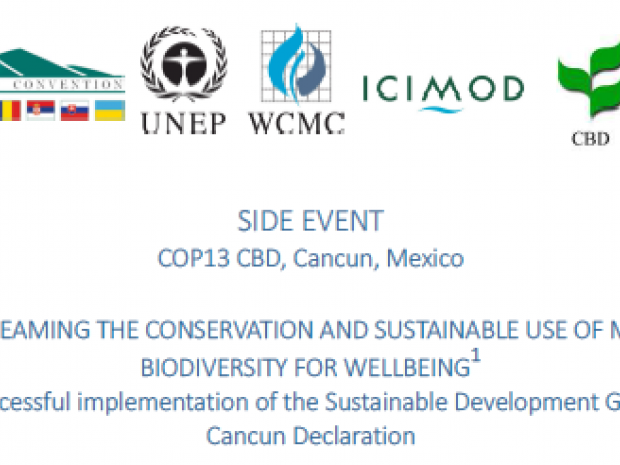Why is the protection of mountain biodiversity also crucial for human well-being?
Discussion details

The Slovak Presidency of the EU Council, together with the Secretariat of the Carpathian Convention, UN Environment and the Convention on Biological Diversity, is organizing a debate on mountain biodiversity – and the need to better include its protection in all relevant economic sectors to ensure sustainability in these vulnerable regions.The session will draw on best practices and solutions that have led to species conservation and increased human well-being in the Carpathians, as well as other mountain regions such as the Alps and Hindu-Kush Himalayas. It will furthermore provide guidance towards implementation of the Cancún declaration.
The side event aims to recall the importance of protecting and conserving biodiversity in mountain areas, where ecosystem services play a vital role in the well-being of mountain communities but also those in downstream low-land areas, through regulating the climate, providing raw materials maintaining habitats and providing water for electricity and agriculture. For this reason, biodiversity conservation and protection must be a key criteria while developing policies in economic sectors that are key to sustainable development in mountain regions, such as transport , tourism strategies and agriculture.
"Biodiversity is crucial for both the species we have in our mountains but also for the well-being of our communities. Therefore, we have to pay attention to biodiversity in every key economic sector. We are glad that more and more sectors such as tourism, forestry, transport and agriculture understand that their economic activities depend on biodiversity and therefore they do not jeopardise their business in the future. We hope that the Carpathian knowledge platform, which collects many good practices, will provide inspiration for other mountain regions and ecosystems as well", says Rastislav Rybanic Director-General of the Slovak Ministry of the Environment on behalf of the current EU presidency.
During the side event, success stories from the Carpathian region will be presented where the mainstreaming of biodiversity into key economic sectors has provided benefits to both humans and nature. The platform, supported by UN Environment, is intended to be an inspiration for other mountain regions, providing guidance to policy makers towards implementation of the Sustainable Development Goals that also contain strong targets related to mountain biodiversity.
The ‘Alpine Carpathian Corridor’ project (a EU-funded flagship project) is an example of a successful initiative that boosted conservation of wild populations by ensuring ecological connectivity between the Alps and the Carpathians. Fragmented by roads and infrastructure, the dynamic migratory area between Vienna and Bratislava,– which supports the movement of lynx, bear and deer - was under threat. Stakeholders from Austria and Slovakia, including the national highway companies, saw this as a major concern and have since supported technical solutions such as green bridges (serving as wildlife corridors) and spatial planning, among other initiatives.
In addition, by having signed the Protocol on Sustainable Transport, all Parties to the Carpathian Convention have committed themselves to avoid habitat breakup in all transport and infrastructure plans. Many car accidents on roads and highways in mountain regions are caused by wildlife accidents.
Such best practices are currently gathered by the Carpathian Convention Secretariat and UN Environment in a new online knowledge sharing platform, which will guide policy-makers for future planning in mountainous zones. It is hoped the concrete tool will allow great solutions and examples to 'travel' to other mountain regions, inspiring them for similar activities and initiatives.
When? 9 December 2016, 18:15-19:45
Where? Like-minded mega diverse regional group meeting room, CBD COP , Cancún, Mexico.
MEDIA CONTACTS:
Head of Communications, Europe Office, UN Environment, Isabelle.valentiny@unep.org, +41 79 251 82 36.
Organizer of the event on the ground: Matthias.jurek@unvienna.org.
Log in with your EU Login account to post or comment on the platform.